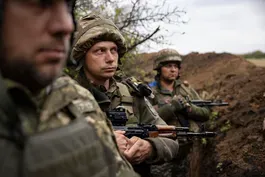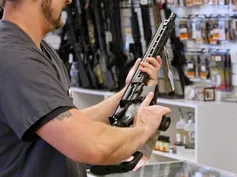
What’s behind a severe decline in Florida’s citrus harvest
Clip: 5/13/2023 | 6m 43sVideo has Closed Captions
What’s behind a severe decline in Florida’s citrus harvest
Oranges have long been synonymous with Florida, as a key element of the state’s economy. But this year, Florida projects the worst citrus harvest since the Great Depression, threatening a way of life for many. William Brangham reports on what’s driving the decline and who is affected.
Problems with Closed Captions? Closed Captioning Feedback
Problems with Closed Captions? Closed Captioning Feedback
Major corporate funding for the PBS News Hour is provided by BDO, BNSF, Consumer Cellular, American Cruise Lines, and Raymond James. Funding for the PBS NewsHour Weekend is provided by...

What’s behind a severe decline in Florida’s citrus harvest
Clip: 5/13/2023 | 6m 43sVideo has Closed Captions
Oranges have long been synonymous with Florida, as a key element of the state’s economy. But this year, Florida projects the worst citrus harvest since the Great Depression, threatening a way of life for many. William Brangham reports on what’s driving the decline and who is affected.
Problems with Closed Captions? Closed Captioning Feedback
How to Watch PBS News Hour
PBS News Hour is available to stream on pbs.org and the free PBS App, available on iPhone, Apple TV, Android TV, Android smartphones, Amazon Fire TV, Amazon Fire Tablet, Roku, Samsung Smart TV, and Vizio.
Providing Support for PBS.org
Learn Moreabout PBS online sponsorshipJOHN YANG: To many people, Florida means oranges.
They're a key element of the state's economy.
This year, Florida projects the worst citrus harvest since the great depression.
William Brangham examines what's driving this decline and how it threatens a way of life for many Floridians.
WILLIAM BRANGHAM: In Central Florida, orange grove stretch as far as the eye can see.
What's not so visible is the disease that is slowly killing one of this state's biggest industries.
So if I didn't know better, I would look at this and think, like, oh, this looks like you got a lot of fruit.
The tree looks pretty decent to me.
FRANK HUNT: It looks like a lot of fruit because you don't know how much fruit should be on the tree.
These trees are suffering.
They are not generating an economic crop.
WILLIAM BRANGHAM: Frank Hunt is a third generation citrus grower.
His grandfather Dealy started the Hunt brothers family business in Lake Wales, Florida, a century ago.
Because all that fruit that's dropped, that's waste.
FRANK HUNT: Yes, that's waste.
You can't do anything with it.
And probably 50, 60 percent of the crop that was set ultimately drops on the ground before it's harvested.
WILLIAM BRANGHAM: An insect borne bacteria has infected virtually every orange tree in his groves.
FRANK HUNT: Some trees take a little longer than others to die, but we're basically fighting a losing battle trying to sustain the tree.
The plastic bins would be set on the conveyor.
WILLIAM BRANGHAM: For the Hunt Brothers business, it's had a devastating impact.
So this would have been loaded with oranges.
FRANK HUNT: Full conveyor.
WILLIAM BRANGHAM: Climbing up the road, FRANK HUNT: Full conveyor.
WILLIAM BRANGHAM: Millions of oranges were once processed, sorted, and shipped from this packing house.
So if I had been here at its peak, what would this have sounded like or looked like?
FRANK HUNT: We wouldn't have been talking right here because the machinery is such that you'd have that rubber machinery and the conveyors running that where we're standing, actually, was the packing area.
WILLIAM BRANGHAM: Last year, the conveyor belts were turned off, doors shuttered, and 50 workers lost their jobs.
You got a couple of cobwebs here.
I mean, this has got to feel like -- FRANK HUNT: Well, this is the first time I've walked back here in a while, so we start crying, y'all forgive me.
WILLIAM BRANGHAM: And this year, Florida projects its orange harvest will be the lowest since the 1930s.
MICHAEL ROGERS, Citrus Research And Education Center, University of Florida: I look back to when I first started working in citrus in 2004.
Florida produced over 220 million boxes of oranges.
WILLIAM BREANGHAM: Michael Rogers is the director of the University of Florida's Citrus Research and Education Center.
MICHAEL ROGERS: Fast forward 20 years, and we can't produce enough oranges.
We're down to a 16 million box crop from 220 million down to 16 million.
WILLIAM BRANGHAM: While several factors are to blame for this crisis, hurricanes Ian and Nicole damaged a lot of trees when they tore through Florida last year.
Rogers says the main issue is this blight, which is known as citrus greening disease.
It's spread by tiny insects known as psyllids.
While nearly impossible to see with the naked eye, their impact has been catastrophic.
MICHAEL ROGERS: Pretty much all the trees in commercial groves now in Florida are infected with this disease.
WILLIAM BRANGHAM: All of them?
MICHAEL ROGERS: Yes.
The ones that aren't were planted yesterday is what I tell people.
WILILAM BRANGHAM: Wow.
MICHAEL ROGERS: Because it doesn't take long for them to become infected.
WILLIAM BRANGHAM: The disease slowly kills the roots, which starves the tree of nutrients, and it often changes the color and ruins the taste of the fruit.
That is, if the fruit doesn't fall from the limb first.
Far too early to be harvested.
MICHAEL ROGERS: Before you see any symptoms of this disease in the plant, we'll lose 30 or 40 percent of the root system.
The leaves start to get these modeled appearances.
They don't look nice dark green.
They look weak and stunted.
WOMAN: A day without orange juice is like a day without sunshine.
WILLIAM BRANGHAM: Since the vast majority of Florida's oranges are squeezed into juice, this disease has also squeezed wallets.
Orange juice is just the latest staple to slam inflation weary consumers.
Whether it's fresh squeezed or concentrated, retail prices have hit record highs for both.
ARCHIE RITCH, Business Owner: It's blueberry puree.
WILLIAM BRANGHAM: Citrus greening is also hit smaller growers especially hard.
ARCHIE RITCH: Most all of your mom and pop, I would say farmers that had 10, 20, 40, 80 acres, they're very few and far between.
WILLIAM BRANGHAM: Archie Rich runs this general store in Haynes City, Florida selling his fruit and his freshly squeezed juice directly to customers.
On top of citrus greening, last year's hurricanes left him with his worst orange heart harvest since he started here in 1992.
Five years from now, ten years from now, are you still growing citrus in Florida?
ARCHIE RITCH: It's hard for me to imagine Florida without having citrus.
I don't think it'll ever get back to where it was.
BRENDA EUBANKS BURNETTE, Executive Director of the Florida Citrus Hall of Fame: This threat we've never dealt with anything this severe, this capacity where it has just brought our industry basically to its knees.
WILLIAM BRANGHAM: Brenda Eubanks Burnette runs the Florida Citrus Hall of Fame.
She's been involved in the industry since 1981 when she was named Florida's Citrus Queen.
BRENDA EUBANKS BURNETTE: Once the queen always is queen, I guess.
WILLIAM BRANGHAM: I don't think I've ever interviewed a queen before.
Eubanks Burnette says citrus has always been a part of the state's DNA and she remains optimistic about the future.
BRENDA EUBANKS BURNETTE: We're seeing people investing back into the industry so hopefully it's not something that's going to be completely going away.
There were some times when we did not think that were going to have an industry here in Florida.
WILLIAM BRANGHAM: Back at the University of Florida's citrus research facility several solutions are being tested.
One is growing trees under these gigantic protective canopies.
They're covered with a mesh that's fine enough to block the insects but still allow rain and sunshine in.
Another is developing new blight resistant varieties of citrus trees.
MICHAEL ROGERS: There's a lot of things that we can do that are short term fixes to try to keep these trees healthy.
But ultimately the solution is going to come in the form of a new variety, a new citrus plant variety that's resistant to disease whether it be through conventional breeding or genetic modification.
WILLIAM BRANGHAM: Today there is still no cure and many of these solutions aren't affordable for growers like Frank Hunt.
But he's not giving up.
Hunt says he's passing his 4,000 acres onto his son.
FRANK HUNT: The question would be is there anything for the generation after that?
And I don't know and I don't know what that'll look like.
WILLIAM BRANGHAM: It's a question many here in Florida are now asking.
For "PBS News Weekend," I'm William Brangham in Lake Wales, Florida.
New documentary shows Ukrainians’ fight for survival
Video has Closed Captions
New documentary shows Ukrainians’ fight for survival, devastation of war (7m 23s)
States grapple with minimum age restrictions for buying guns
Video has Closed Captions
As states grapple with age limits for buying guns, what’s the potential effect? (6m 17s)
Providing Support for PBS.org
Learn Moreabout PBS online sponsorshipSupport for PBS provided by:
Major corporate funding for the PBS News Hour is provided by BDO, BNSF, Consumer Cellular, American Cruise Lines, and Raymond James. Funding for the PBS NewsHour Weekend is provided by...













